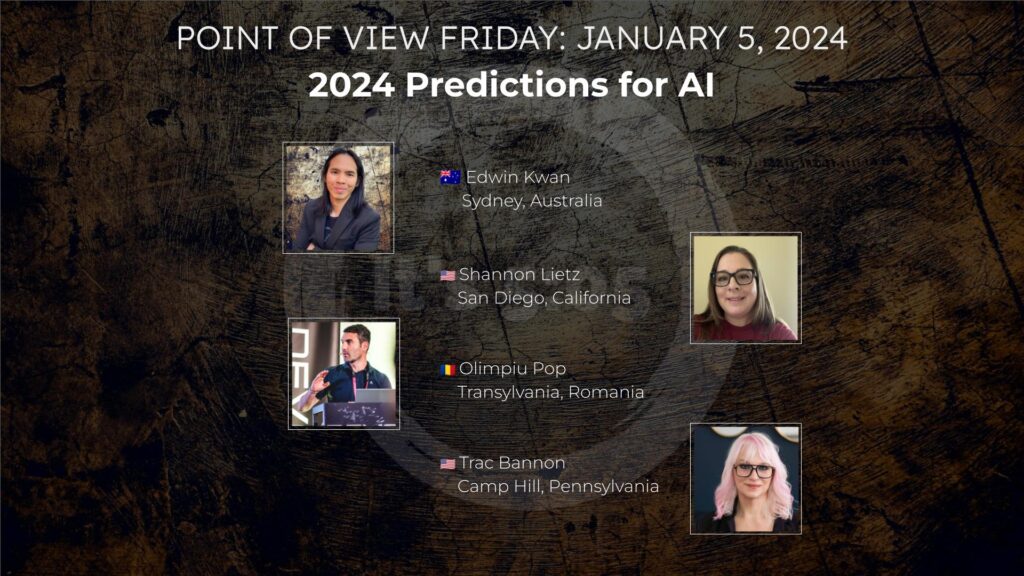January 5, 2023

In this Episode:
It’s January 5th, 2024, and time for a Point of View Friday where we will cover a single topic from multiple perspectives. Today’s point of discussion is what does the near AI future look like? And what should you consider when utilizing AI for your personal or business solution?
Today’s contributors are Trac Bannon from Camp Hill, Pennsylvania, Olympia Pop from Transylvania, Romania, Shannon Lietz from San Diego, California, and Edwin Kwan from Sydney, Australia.
We’ll start with Edwin’s thoughts on an algorithm that can give a thumbs up or down to your job application.
Point of View Friday: 2024 AI Predictions
Edwin Kwan
2024 AI Predictions
 AI took center stage in 2023 with tools like ChatGPT making headlines. What can we expected in 2024? Here’s my predictions on how it’ll revolutionize the way we code, secure and hire. I’m Edwin Kwan from Sydney Australia and I’m going to let an AI clone of my voice do the talking.
AI took center stage in 2023 with tools like ChatGPT making headlines. What can we expected in 2024? Here’s my predictions on how it’ll revolutionize the way we code, secure and hire. I’m Edwin Kwan from Sydney Australia and I’m going to let an AI clone of my voice do the talking.
Imagine a world where code practically writes itself. AI-powered development tools are on the horizon, churning out code completion suggestions, unearthing hidden bugs, and even conducting automated testing. Low-code and no-code platforms will rise, letting anyone become a programmer, potentially doubling software development speed.
But before we toast to faster releases, let’s raise an eyebrow at the security implications. Blindly trusting AI outputs could introduce unseen vulnerabilities. While these tools are expected to learn and improve significantly in 2024, the potential for bug-filled code still lingers.
This is where AI comes in, again, but on the defensive side. Cybersecurity will get a boost from AI too, with tools capable of penetrating systems, simulating attacker behavior, and providing real-time security monitoring. AI-powered firewalls will rise, learning to adapt to constantly evolving threats.
However, this feast of innovation comes with a side dish of challenges. Both developers and cybersecurity professionals will need a whole new skillset to handle these powerful tools. The coding landscape will shift, demanding adaptability and a deeper understanding of how AI works. Cybersecurity teams will need to learn to orchestrate these defensive AI tools, becoming less like hunters and more like trainers.
It’s the real me again, so while AI replaced part of my audio in this segment, I want to clear the air and say that AI isn’t going to be replacing us just yet. But it could stop you from getting hired. AI powered tools are already being used to automate resume screening and promotion recommendations and it might discriminate. Imagine, your entire career path hanging in the balance of an algorithm analyzing your resume. Bias and inefficiencies in these algorithms could unfairly hinder your chances.
So, while AI speeds up code and secures systems, we need to ensure it doesn’t slow down opportunities or introduce new biases. This isn’t just about tech; it’s about responsible innovation, ensuring everyone has a seat at the table in this brave new AI-powered world.
Remember, stay informed, stay adaptable, and most importantly, stay human. This is Edwin Kwan, signing off.
Resources
– Wired: https://www.wired.com/story/hilke-schellmann-algorithm-book-ai-jobs-hiring/
Shannon Lietz
2024 AI Predictions
 Hi, this is Shannon Leitz reporting on the Win, Lose, or Draw of AI predictions in 2024. The Financial Brand had an article out called, ChatGPT will become the Chat Oh My God of 2024. In there they talk about Forrester’s predictions about the banking industry.
Hi, this is Shannon Leitz reporting on the Win, Lose, or Draw of AI predictions in 2024. The Financial Brand had an article out called, ChatGPT will become the Chat Oh My God of 2024. In there they talk about Forrester’s predictions about the banking industry.
We think the banking industry will see a bit of a pinch where they’ve radically adopted ChatGPT with the rest of the 100 million plus users that OpenAI saw in 2023. And this brings with it some really big opportunities for other companies that might be able to help the banking industry. But potentially, we will see what might end up being an AI centric data breach over the course of 2024, simply from banking customers finding out that their data might be coming from an AI model that they didn’t give permission to.
The regulatory aspects of banking are really important, so we think that the banks might lose during 2024 if they didn’t have great governance programs in place for AI usage in 2023. We tend to agree with that article, even though it’s a little bit of a Fear, Uncertainty, Doubt, piece, it’s something to be considerate of and to have in the forefront of your mind when you’re thinking about what you’re going to do with your own governance programs for AI.
Another interesting article that was out there was the one on what AI will bring in 2024 for predictions from the LA Times. They believe that regulators are going to step in. Well, we’ve already seen some of that happening in 2023 towards the end of it, with the U. S. and the U. K. really bringing more AI requirements to the forefront for specifically government use cases.
The winners in this case are going to be the software suppliers with generative watermarking capabilities in particular, and those that may have enumerated it with the C2PA, a program that was put in place for content authenticity. We think that they’re going to have greater opportunities in 2024, so definitely stay tuned for some of those companies that have embarked on that progress over the last few years and really put some effort into thinking about what would happen with AI coming to the forefront.
And then finally, you know, if you look out at what was supplied to folks making these predictions, there’s lots of government regulatory information, new executive orders that are impacting how we think a bit about AI. In particular, the principles of traceability and transparency. Those are going to require more testing friction and additional supplier information.
So, we think that the predictions around the use of SBOM Software Bill of Materials, for those who don’t know, and additional security protections from product security, if you haven’t yet implemented things like static code analysis or threat modeling, we think that we’re going to see a little bit more of an opportunity in 2024 to invest in those key areas to be ready for initiatives that might come forward from the government in 2025. We do think it takes a couple of years to get there.
Additionally, there were some mentions of interestingly, the requirement to have AI licensing or having users that are AI licensed. Those types of initiatives really have been talked about over the last couple of decades and haven’t come to the forefront very quickly.
We still think that there’s not necessarily going to be demand there, but for training companies that are out there looking to see whether they’re going to see an uptick in 2024, we think that there will be. And we also think that there’s going to be a requirement for greater amounts of AI training to educate the workforce on best use cases, employing some of the governance required to make AI safe, and to best leverage this technology within the workforce.
Again, this is Shannon Lietz reporting on the Win, Lose, or Draw of AI predictions in 2024. See you out there.
Tracy (Trac) Bannon
2024 AI Predictions

Are you tired of hearing about AI yet? I’m personally tired of the deluge of generated blog posts with all the embedded unicode emojis. That said, 2024 will be more exciting, innovative, and possibly dangerous than 2023.
Hello, This is Trac Bannon reporting from Camp Hill, Pennsylvania.
There is still a ton of novelty around Generative AI in particular. Moving into the new year, we will see much more rigor by organizations evaluating AI and generative technologies. As the novelty fades, the imperative shifts to demonstrating tangible productivity gains and new value.
This is not just about adopting technology for its own sake but about integrating it in a way that enhances operational efficiency and drives innovation. The crux here is not just adoption but adaptation—understanding how these technologies can be tailored to specific organizational needs and goals.
Adopting AI comes with its set of challenges. A significant one is the initial loss of productivity. For example, what if it takes a marking specialist 2 hours to engineer the perfect prompt when they could have written the copy in 30 minutes? If they are able to reuse that prompt, it will have a return on investment. What about the situation when an early career software developer generates code for a function? Generally they are presented with 3 or more options to choose from. They often don’t have the skill to discern which option to pick and worse, code generation is still in its infancy with many defects and gaps in the code.
In 2024, we will see continued security breaches by the average employee. The cause? Lack of adequate training. That leads me to my next prediction, 2024 will be the year of being “AI savvy”. Being able to use AI tools relevant to your career will be as essential as being proficient with traditional office productivity tools.
2024 isn’t just about knowing how to use the technology; it’s about understanding its implications, strengths, and weaknesses. Without widespread literacy in AI and ML, organizations risk not fully leveraging the technology’s potential and exposing themselves to avoidable vulnerabilities.
That leads me to my next prediction for 2024: AI will become increasingly accessible and we’ll witness an acceleration in innovation and the birth of new ideas. I’m going to call this the democratization of innovation. More people than ever can contribute to the technological landscape. Advances in Low Code and No Code platforms allow there to be citizen developers.
.
It may sound tacky to say: with great power comes great responsibility. This democratization also introduces significant risks, especially around security. As more individuals gain the ability to manipulate and implement AI, the potential for misuse and mistakes grows.
The wave of innovation can’t be stopped but we can focus on security and ethical considerations.
My next prediction for 2024 is the rise of novice developers. We used to use the term “script kiddies” to mean self taught hackers. Being self directed is an inevitable trend. I may sound like a broken record… 2024 must be the year of AI education and guardrails. The challenge, of course, will be striking a balance between fostering innovation and maintaining quality and security rigor.
From a pure tech perspective, I anticipate the roll-out of autonomous AI agents. Right now, AI is often a tool for us to use. As it is further integrated into our daily lives, it will act without the same level of prompting and perhaps, without it. These agents, capable of operating independently and intelligently, will redefine interactions and operations across various sectors
2024 will see emphasis on two different model types: multi-modal model and small language models. Multi-modals understand and generate information across different types of data. The outcome may be a more integrated and nuanced understanding of the world.
In 2024, smaller, more specialized models will be tailored to specific domains. 2023 was all about large language models, LLMs, a sort of one-size-fits-all. It’s time to focus on precision and efficiency. We’re seeing bespoke models customized to the nuances of different sectors like
like defense, fintech, transportation, and healthcare. A value add with these models beyond enhanced performance is mitigating some risks with broad and generalized models.
I am over the moon excited at what’s to come. We all need a mindset that balances innovation with responsibility, agility with security, and ambition with ethical consideration.
The future is not just about what technology can do but how we choose to use it.
Something To Noodle On
Resources
– Whitehouse: https://www.whitehouse.gov/briefing-room/presidential-actions/2023/10/30/executive-order-on-the-safe-secure-and-trustworthy-development-and-use-of-artificial-intelligence/
– Medium: https://medium.com/@bijit211987/the-rise-of-small-language-models-efficient-customizable-cb48ddee2aad
– Forbes: https://www.forbes.com/sites/garydrenik/2023/10/18/ai–low-code-can-the-two-work-harmoniously-to-democratize-coding-for-developers/?sh=44ab527f7382
– arxiv Cornell: https://arxiv.org/abs/2311.13165#
Olimpiu Pop
2024 AI Predictions
OpenAI took the world by storm in November 2022 and it felt like every company embarked on a journey to incorporate AI. It felt like the Space Race of the Cold War and by the amount of resources used it’s a good comparison.
2023 was eventful to say the least, in the AI space with premieres happening weekly if not daily. As highlights I would name just three, in random order:
- The rapid ascent of OpenAI
- Microsoft’s embracement of the CoPilot everywhere philosophy
- The legislative EU breakthrough
What will it happen in 2024? The race will continue.
On the innovation front EU will try to catch-up to US and China. The European Union promises funding to close the gap and accelerate innovation. At points, it felt that the block tried to use the AI Act to protect the European AI companies.
Still on the European continent, but not in the EU, Norway announces major investments in the Artificial Inteligence space and a new ministery focusing on digitalisation and artificial intelligence. Given the vast resources of the country, I am certain it will attract talent to create a global scale AI product.
On the legislative front EU has the lead, but the battle just starts. It will need to put together an AI directorate and roll-out the legislation in each of the 27 states of the block in the next two years. All this happening while it tries to solve the Cyber Resilience Act in a way that will not hinder innovation. If you are afraid that companies will avoid EU because of the AI Act, I am certain it will not be the case. OpenAI already opened an European hub in Dublin, to ensure it can access data on European soil. Similar approaches had also Apple, TikTok, Meta, Google and Twitter.
On the other side of the Atlantic, where OpenAI started the revolution the situation is the other way around. Tech giants like Alphabet, Microsoft, Meta and OpenAI will continue the fight to get as much of the AI pie as possible. Even if it started slower, the US Administration is giving signs that some sort of regulation will come into place sooner or later. Given the upcoming elections I would put my bets for the later.
The elephant in the room has four nuances: ethical, cultural and environmental. And these are global. Even though there are ambassadors of these topics, I have my doubts that anything major will happen with them. It’s plain Maslow Pyramid arithmetic: in the race for capital most of the companies will focus on getting revenue, leaving these behind. Of course, I hope I will be wrong.
On the micro level, I hope to see more smaller, open source models being adopted. These will actually help on multiple fronts, from garrage like innovation for companies with less resources and even in the EU Cyber Resilience Act where hopefully will open the eyes of the decision makers.
What I know for sure is that 2024 will be a great wave to ride. Olimpiu Pop, shared his thoughts about AI from Transylvania, Romania. More opinions and resources can be found on 505updates.com.
Resources
– The Guardian: https://www.theguardian.com/commentisfree/2023/dec/23/ai-chat-gpt-environmental-impact-energy-carbon-intensive-technology
– Medium: https://medium.com/ethical-ai-resources/norway-increases-investment-in-artificial-intelligence-research-by-one-billion-nok-e134fcea337e
– Medium: https://medium.com/ethical-ai-resources/norway-set-to-announce-new-minister-for-digitalisation-and-artificial-intelligence-5f80bd9b89b7
– Regjeringen.no: https://www.regjeringen.no/en/dokumenter/nasjonal-strategi-for-kunstig-intelligens/id2685594/?ch=1
– TechCrunch: https://techcrunch.com/2024/01/02/openai-dublin-data-controller/













